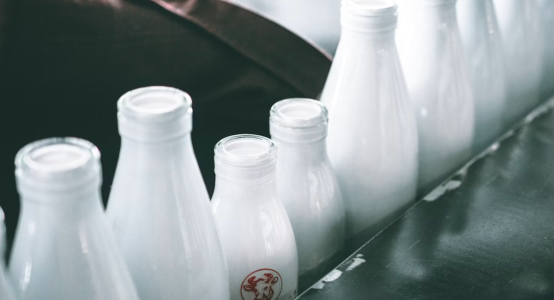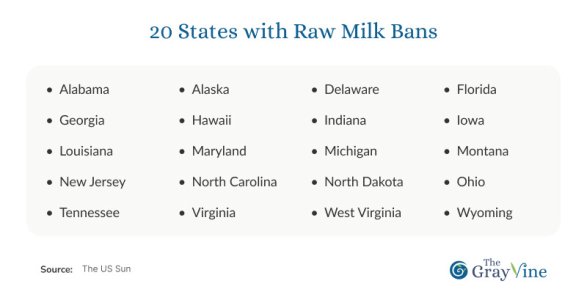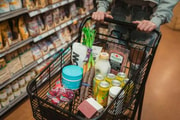Is your favorite breakfast off-limits? 20 states ban this grocery staple—but these 3 loopholes might let you get it anyway
- Replies 0
If your dream breakfast includes a glass of raw milk, you might be out of luck—depending on where you live.
In 20 states across the US, raw milk is completely banned from store shelves.
But here’s the twist: three states have built-in workarounds that allow die-hard fans to keep the tradition alive.
So, why is raw milk so tightly restricted? And how are some folks still getting their hands on it legally?
Pasteurization is a process that heats milk to kill off dangerous bacteria like E. coli, Listeria, and Salmonella. Homogenization follows, blending the fat evenly so it doesn't separate. Fortification with vitamins A and D and sterile packaging are the final steps before it hits grocery shelves.
Raw milk skips most of that. Fans say it tastes better, feels fresher, and contains natural probiotics and enzymes that supposedly aid digestion. But the CDC says otherwise—pointing out that raw milk is at least 150 times more likely to cause foodborne illness than pasteurized milk.
That’s no small risk, especially for children, pregnant people, seniors, and anyone with a compromised immune system.


Louisiana and New Jersey are the strictest—they allow no sales or distribution of raw milk whatsoever. Other states on the list sometimes permit it for pet use or on-farm purchases, provided the seller has the right license or includes warning labels.
Also read: Are you eating the riskiest foods in America? Here’s what you need to know—without panicking
For some, it’s about nostalgia—bringing back memories of family farms and simpler times. For others, it’s a belief in natural nutrition over industrial processing.
But the FDA and CDC remain clear: the risks far outweigh the benefits. Outbreaks linked to raw milk still happen, and they’re often severe.
While state-level testing is still ongoing, some food safety experts are sounding alarms about long-term oversight.
Also read: Is your raw milk safe? Shocking bird flu revelation hits California!
If you thought it was just milk under pressure, think again. Egg prices have been climbing too, thanks to ongoing shortages linked to the H5N1 bird flu outbreak. Looks like America’s breakfast table is in for a bumpy ride.
Read next: Public health at risk? FDA suspends key safety checks after layoffs

Do you remember drinking raw milk as a kid? Are you a fan of the unprocessed stuff—or are you sticking with the pasteurized kind? We’d love to hear your thoughts in the comments below.
In 20 states across the US, raw milk is completely banned from store shelves.
But here’s the twist: three states have built-in workarounds that allow die-hard fans to keep the tradition alive.
So, why is raw milk so tightly restricted? And how are some folks still getting their hands on it legally?
Why raw milk is banned in the first place
Raw milk is exactly what it sounds like—milk that hasn’t been pasteurized or homogenized. Unlike the familiar cartons you find in stores, raw milk comes straight from the cow, with minimal processing.Pasteurization is a process that heats milk to kill off dangerous bacteria like E. coli, Listeria, and Salmonella. Homogenization follows, blending the fat evenly so it doesn't separate. Fortification with vitamins A and D and sterile packaging are the final steps before it hits grocery shelves.
Raw milk skips most of that. Fans say it tastes better, feels fresher, and contains natural probiotics and enzymes that supposedly aid digestion. But the CDC says otherwise—pointing out that raw milk is at least 150 times more likely to cause foodborne illness than pasteurized milk.
That’s no small risk, especially for children, pregnant people, seniors, and anyone with a compromised immune system.

In 20 states across the US, raw milk is completely banned from store shelves. Image Source: Mehrshad Rajabi / Unsplash
These 20 states have said “nope” to raw milk
As of now, these US states have banned the retail sale of raw milk for human consumption:
Source: The US Sun
Louisiana and New Jersey are the strictest—they allow no sales or distribution of raw milk whatsoever. Other states on the list sometimes permit it for pet use or on-farm purchases, provided the seller has the right license or includes warning labels.
The loopholes: 3 states where raw milk is still flowing
Raw milk lovers, don’t give up just yet. If you live in the right state—and are willing to follow some extra rules—you can still get your fix legally:- California: Raw milk is allowed in stores, but it must come from a licensed dairy and carry a clear health warning label.
- Pennsylvania: Retailers can sell raw milk, but only with a special permit.
- New York: Sales are permitted directly from the farm where the milk was produced.
Also read: Are you eating the riskiest foods in America? Here’s what you need to know—without panicking
Who’s drinking raw milk—and why?
Despite the health warnings, raw milk has its loyalists. According to PBS, about 1% of US adults drink it weekly. They claim it tastes better and contains more natural nutrients.For some, it’s about nostalgia—bringing back memories of family farms and simpler times. For others, it’s a belief in natural nutrition over industrial processing.
But the FDA and CDC remain clear: the risks far outweigh the benefits. Outbreaks linked to raw milk still happen, and they’re often severe.
A new twist: The FDA just suspended milk quality testing
In a concerning development, the FDA suspended its national milk quality testing program in April 21. The move, prompted by budget cuts, lab closures, and staffing shortages, halted official proficiency testing for Grade A milk—raw milk included.While state-level testing is still ongoing, some food safety experts are sounding alarms about long-term oversight.
Also read: Is your raw milk safe? Shocking bird flu revelation hits California!
If you thought it was just milk under pressure, think again. Egg prices have been climbing too, thanks to ongoing shortages linked to the H5N1 bird flu outbreak. Looks like America’s breakfast table is in for a bumpy ride.
Read next: Public health at risk? FDA suspends key safety checks after layoffs
Key Takeaways
- Raw milk is unpasteurized and banned in 20 US states due to safety concerns.
- New Jersey and Louisiana enforce the strictest bans with no exceptions.
- California, Pennsylvania, and New York allow raw milk under limited conditions.
- The FDA recently suspended its milk quality testing program due to federal budget issues, raising food safety questions. Egg prices remain high nationwide due to H5N1 outbreaks.






